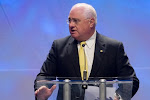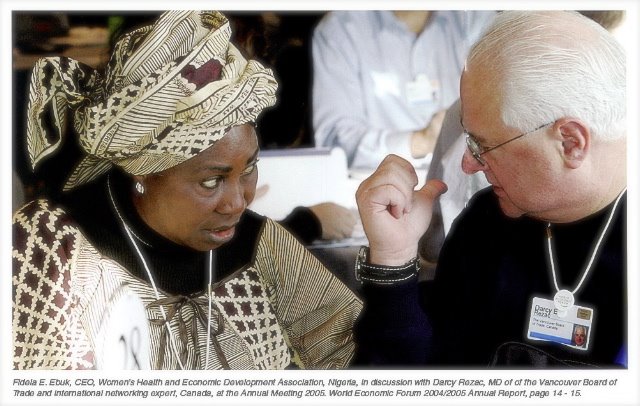
Mecca of uber-networking
Darcy and I have been fortunate to have attended the World Economic Forum in the remote Swiss Alpine village of Davos a number of times. It is an annual think tank of business, academic, NGO and political leaders from around the world with the mission "to improve the state of the world."
The Internet and cell phone access were late to arrive in Davos, and before it did delegates would gather in the hallways and coffee bars in that remote Alpine conference center between sessions and engage in face-to-face conversation with everybody around. Not so much anymore. While still the Mecca for great conversations and in-person contact, today, delegates are as likely on their cell phones and blackberries as chatting up a new acquaintance. 'Social networking' has in fact become less social. It is the same at gatherings around the world. Turns out, this may be bad for our health.
Rather than expanding our network with new contacts, increasingly we seem intent on reinforcing our existing contacts with more frequent phone calls, emails and texting with people we already know. And it may well be deadly.
No kidding! Rik Myslewski of the UK's The Register reports on research that says, "There is mounting evidence that Facebooking, Twittering, and other 'social networking' activities can kill you."
This is according to a study in the Biologist, the journal of the British Institute of Biology by Aric Sigman. It details how face-to-face contacts with friends and family are being replaced by face-to-screen isolation." Lack of real-world social interaction or in-person networking--can increase susceptibility to cancer, dementia, heart disease, lupus and even the common cold according to the study. In less than two decades, the number of hours per day in face-to-face contact has halved, matched by a similar increase in the use of electronic devices. The number of people saying there is no one with whom they can discuss important matters nearly tripled. Check out this BBC article and interview with Sigman.
We are surprised these findings have not been more widely discussed. They square with myriad earlier studies that show the value of connecting in-person with others. Daniel Goleman in his famous book, Social Intelligence, cites research that shows people are wired to connect face-to-face, and that it impacts health positively. Hence the value of support groups for patients after major illnesses or operations to speed recovery.
Harvard Professor, Robert Putnam, cities research in Bowling Alone (page 331) that shows if someone is a member of no group, but joins one then their chances of dying the following year are reduced by fifty percent, same as if they quit smoking!
The message here is the Internet, face-book, twitter and social networking are great extensions of your in-person network, but a not a substitute for it. Like TV, it can be addictive and if it keeps you from having friends and family to dinner, or from social gatherings, it is likely bad for your health and longevity. So join something, like The Board of Trade or Y and go to functions in person. Connect, for real, and for good. Beware of "Death by Internet"
-Gayle



8 comments:
Yes, it is likely true. This UK study squares with other research going back more than 15 years that shows people who socialize and network are healthier and live longer. They don't get sick as often and get better more quickly when ill. Prof Robert Putnam (and many others) reports on these studies in his famous book, BOWLING ALONE (Simon & Schuster), page 331.
What to do about it? Well abstinence is not the answer. Alcohol and extreme skiing can be deadly too. Moderation and caution are the watch words. Keep up face-to-face contacts, go to meetings, lunches, receptions and dinners. That is really the only way that authentic rapport can be established. Email is great to stay in touch, but no way to meet and engage new contacts if we want a postive and meaningful network for business and life. That's my story, Gayle and I'm sticking to it!
--Darcy
@Darcy
I agree with your moderation comment. We have all seen that person that gets burned out by going to every single networking function in the city that doesn't grow their business and just ends up tired and disillusioned.
The same goes for social networking sites. Activity does not equal results. Purposeful activities equal results.
In the social media for sales professionals programs that Stephen Jagger and I both do we talk about the importance of "taking it offline." Steve and I have built large networks online but then 3 times a month hold specific functions in the city to drive people out of their cubicles and offices and into a networking event. This is where the magic happens.
In addition to this not a day goes by where someone recognizes me from twitter and will introduce themselves at a coffee shop or even a Board of Trade event. We feel like we already know each other and it's easy to connect.
Personally, I know instinctively that I am healthier and happier because of my face-to-face relationships....I am just hard-wired for this kind of communication, and my most memorable moments have almost all been face-to-face. I think the trick is to get people who are not naturally comfortable doing this, to get comfortable, and to get those of us who would rather see people used to the idea that sometimes you can reach more people more effectively and quickly using technology!
Darcy,
My interest is in the application for business, and quite frankly there isn't enough engagement by organizations in this. My blog on www.bedifferentorbedead.com provides an overview of some that are using it. A great opportunity for the Board of Trade.
Roy Osing, Author, BE DiFFERENT or be dead: Your Business Survival Guide
Social networking can be a great tool for getting to know people or staying in touch, but one should note that it does not only affect one’s health but also their profession; for negative material on social networks can be a career killer. With more corporations and employers checking out their employees MySpace and Facebook pages one’s personal life is quickly becoming a screening and judging mechanism of their employers. I recall an example I heard at a seminar wherein an employer was faced with hiring two candidates with equal merit, he went on their respective Facebook sites and disqualified one of the candidates because he posted pictures of himself drunk at a party.
It is great to stay in touch with colleagues and friends abroad through social network sites, sometimes it is the only way. However if people are in the same cities it is ok to send Instant Messages to Facebook friends once in a while, but it is imperative to have face to face interaction and socialize (network) with them because that is what solidifies relationships.
Excellent point, Vana, have heard similar stories.
May not kill you dead, but may kill your career!
-Darcy
I agree 100% with the concept of 'all things in moderation' reflected in the previous comments and I recognize the risks of posting inappropriate content; but to give the medium its due, it does provide countless opportunities to reconnect with old friends, stay in touch with current ones, and best of all, make a few new ones along the way. Where geography allows, I do make a point of trying to get face-to-facewith everyone I've connected with on-line, but where it doesn't, I'm still thankful for the connection. If social networking is going to kill me, so be it. There are far worse ways to go.
I generally agree, Jim. Great tool if you do not let it consume you...here it is 23:55 and I am answering your comment! Got to do my Twitter next (which is quite different, I must say), then check my emails! On second thought maybe I should go to bed and budget half hour in the morning for all that...
Does become addictive, though, doesn't it? If you are not careful, could be fatal...
Thanks for the great comment.
-Darcy
Post a Comment